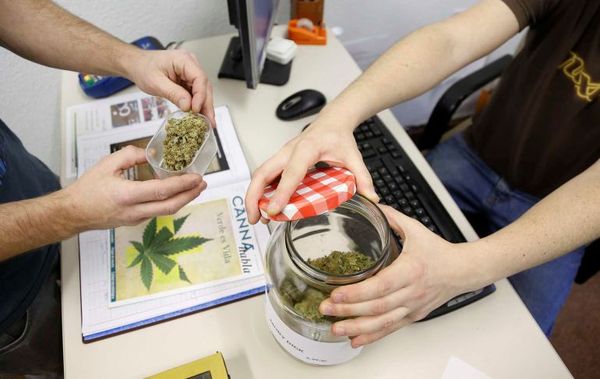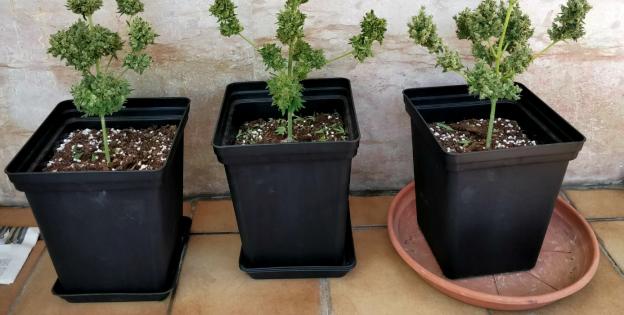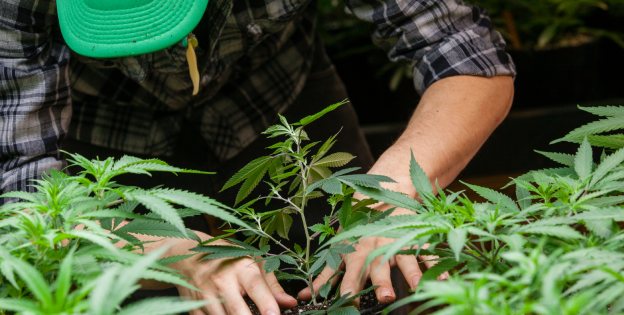- How is the confinement affecting cannabis users and business owners in Spain?
- Are Cannabis Social Clubs still providing marijuana? Do patients have access to medical cannabis? Did users stock up before the government ordered the home confinement?
- We speak to CSC managers, medical cannabis users, recreational users, and even dispensary owners from California, to analyse how the measures adopted to combat the COVID-19 pandemic are affecting cannabis consumers.

On Saturday, 14 March, the Spanish government declared a state of alarm across the whole country, limiting citizen mobility with the aim of slowing down the number of COVID-19 infections amongst the population. This confinement started on 15 March and only allows citizens to go out to purchase essential items such as food, medicines, or any other products sold in supermarkets, newsstands, chemists', and tobacconists'.
Bars, libraries, restaurants, theatres, and businesses outside the food sector closed up shop on Sunday, 15 March. Cannabis clubs, where cannabis users obtain their cannabinoids from, are included in the list of establishments that were forced to close down from one day to the next, with hardly any time to warn their members. We have talked to club managers and cannabis users to learn how the confinement is affecting cannabis distribution in these exceptional circumstances.
How to get cannabis in Spain during the Coronavirus quarantine
Given the lack of cannabis regulation in Spain, cannabis supplies in the country come from three different sources: self-cultivation, cannabis social clubs, and the black market. Let's have a look at how these three routes are working to stock up on marijuana during the lockdown.
Self-cultivation: growing your own cannabis during the confinement

Self-cultivation seems to be the safest and most reliable way of getting hold of cannabis during the confinement period. Growing cannabis plants in your own private space seems the most viable option as you don't depend on third parties to replenish your marijuana pantry. Providing that you have your grow in your own home, this is certainly the best choice to continue enjoying cannabis at this difficult time.
Here's a photo of a WhiteWidow XXL Autoflowering grown in a private balcony. Having a small grow at home, whether indoors (in a grow tent) or outdoors (in a balcony, terrace or garden), is the safest way to obtain cannabinoids during this state of alarm. If you get locked up at home but your beloved plants are with you, everything will definitely be alright.
The main problem with personal cultivation, in these times of confinement, is if you don't have your cannabis plants at home. Those who grow outdoors in mountain areas that are difficult to get to, or those who grow indoors in rented facilities far from their home, don't have it so easy right now.
In these cases, access to grows is proving difficult during the quarantine due to the countless police checkpoints that have been arranged to watch citizen mobility. Guerrilla growers, or those who share grows with others in spaces away from their homes, are having trouble getting to their plants.
Cannabis Social Clubs: closed due to the Coronavirus outbreak
Most cannabis associations closed their doors on Saturday, 14 March, as their activity was not classed as essential by the government. Whether they were located in the Basque Country, Catalonia, Cantabria, or Madrid, the state of alarm made no difference amongst all these provinces. It doesn't matter where you live in Spain: all cannabis clubs have remained closed since then, with members being unable to obtain cannabis through the regular distribution process that they are used to.
"Our members didn't have time to stock up before the confinement started because everything happened so quickly. The association has a WhatsApp group where many people are asking us when we're going to open for business again. The problem is that, if we opened now, we'd be risking getting really heavy fines," explains one of the people at the forefront of the cannabis club Euskal Herria Green, in Vitoria, Basque Country. The people who run the club live more than 10 km away from the association, so it would be difficult for them to travel to fetch the cannabis for their members without being intercepted by the police.
So they assume that members are getting their cannabis on the black market, where marijuana doesn't follow the quality standards that they are proud of. "Club members are over 35 and really value organic growing and consuming a high-quality product, so we weren't jumping at the opportunity of having to opt for the black market."
One of the Spanish communities with a greater proliferation of cannabis clubs is Catalonia. From the cannabis organisation CatFAC, Eric explains that "activity has come to a standstill. On 12 March we announced that all affiliated cannabis associations had to stop their activities and we recommended them to extend distribution for an extra 24 hours after the announcement was made so that users could stock up for 15 days. Subsequently, on Sunday 15 March, all associations closed their doors. The following week, home distribution for medical users was still being carried out, but after the announcement of the suspension of all non-essential activities, this distribution was stopped as well, just as the temporary employment regulation campaign (ERTE) was initiated. Cannabis clubs can benefit from this measure as they have an activity licence but are not included in the list of essential activities as stipulated by the government."
"We have definitely learned our lesson: we know what we want to be and how we want to see ourselves should a similar situation come up in the future."
This is La Kalada's case, a club that closed on Saturday, 14 March, providing an ERTE for its workers. From the club's managing board, Rudeteo insists that his main worry is the future: "What if this restriction lasts longer than we think? I'm worried that we're going to be the last ones to reopen for business because we're being compared with bars and restaurants. So we'll have to see when we can open our doors again, and in what conditions."
CatFAC believe that we can all learn a valuable lesson from these exceptional circumstances. According to Eric, "You always learn something new, and now we know that in the face of this kind of situation you need to look for alternative procedures. Tobacconists hold legal status because tobacco companies have fought long and hard to achieve it. As far as we're concerned, we will try our hardest to ensure that cannabis distribution is considered essential for patients, so that they can receive continued attention in future occasions, especially given that they are a particularly vulnerable group.
"The next time we have to face an exceptional situation like this we will have to take preventive action and not just react to it, as has happened on this occasion. The work should have been done beforehand. We have definitely learned our lesson from this; we know what we want to be and how we want to see ourselves should a similar situation come up in the future. Now it's the time to work hard so we're recognised in advance, not when the situation has already arisen."
Black market: a riskier option in times of confinement
During this confinement, cannabis sales from anonymous people in public spaces are in high demand due to the closure of cannabis clubs, which has left many users unable to get marijuana from their reliable sources. This is a riskier option as there are more policemen than usual on the streets, making sure that people don't gather in public areas. Therefore having to meet someone to purchase cannabis is not an easy task.
This is the most popular way of purchasing cannabis during the lockdown and requires greater amounts of discretion in order to return home with some buds or hashish in your pocket. In addition, you need to have the seller's contact number, as the sporadic sellers that used to prowl the streets in search of customers have abandoned their regular selling spots. A Madrid user claims that "the situation is rather difficult at the moment.
"I know people who grow cannabis and could sell me some, but the problem is we cannot travel, so it is impossible to go get it. Yes, I guess I could give it a go, but I think it'd be a huge risk: first of all, because it would contribute to spreading the virus; and secondly, because I'd risk being fined by the authorities for going where I shouldn't." Another user from San Sebastian agrees to this; she's used to getting her cannabis from one of the cannabis clubs in the city, but they closed their doors on 14 March, before she had the chance to get enough for the quarantine period.
"During the confinement I've gone back to buying the old way. Rest assured it's been more difficult than in the past. Firstly, since I've got used to going to the cannabis club whenever it suits me I've lost touch with the black market sellers. And secondly, by the time I found someone that could sell me hashish, I couldn't get to them without an official authorisation. So in the end a friend who can still go to work arranged to meet with the seller near his workplace, and did a little detour to bring it to mine on his way home after work. We did the exchange on the street next to the rubbish bins, surrounded by police officers," this lady from San Sebastian tells us, who bought 12.5 grams of hashish for 60 euros, having previously paid for it using the Spanish payment platform Bizum in order to avoid paying cash and making the transaction too obvious.
What's the situation like for medical cannabis users during this confinement?
"Normally we have enough for everyone because, by taking a thousand security measures, we have managed to create a collective grow to supply all patients. But due to the confinement, distribution is proving impossible. I have cannabis at home, I'm a regular user, but I'm getting lots of calls from parents who need cannabis to sustain their children's quality of life, and getting it to them has become a real nightmare.
"Not only because you cannot get their kids the relief they need for their epilepsy seizures, but also because, without cannabis, the next step for these patients is to be taken into hospital, which is the last place a patient should be right now as it creates an added risk of catching the Coronavirus".
Lourdes, from the cannabis circle Podemos Cannábico, takes our call. She's worried because she's in touch with a lot of medical cannabis users, and most of them have run out of cannabis during this lockdown. There aren't any cannabis associations available where she lives in El Puerto de Santa Maria (Cadiz), so the only way to get supplies is through self-cultivation. However, a personal grow that several users have put together in an area away from their homes now cannot be accessed, as they don't dare violate the mobility rules established during the state of alarm.
Lourdes defines herself as a user; she doesn't like the distinction between medical and recreational, although cannabis is her best ally to alleviate the symptoms of her endometriosis. She tells us about her first steps in the world of marihuana: "I started using cannabis in my youth as an act of rebellion, but I soon realised that smoking a joint really alleviated my period pains. That's where my interest in the various applications of cannabis started."
Lourdes currently works with Unidas Podemos (Spanish political party) to make advancements in the regulation of cannabis in Spain, because "there are people whose quality of life depends on cannabis use," and this hasn't been taken into consideration during the confinement, which has led to many users being left short. She says that Podemos Cannábico is working on a proposal for patients to be able to gain access to cannabis through cannabis associations during the confinement. Podemos Cannábico and FEDCAD published an announcement a couple of days after we talked to Lourdes.
Carlos is the president of a cannabis association for patients in Zaragoza, and also shares this point of view. He's concerned about patients having enough supplies at all times, and emphasises the need for patients to always have a grow tent at home, as if it were their 'cannabis larder': "I always suggest to patients that they should grow and make their own oils. They shouldn't leave their medicine in our hands because who knows what can happen tomorrow. Maybe we won't be available, or maybe only pharmaceuticals will be allowed to supply it, but at the price of gold."
This association brings together more than 100 members, and several volunteer workers (amongst them doctors and nurses) who regularly guide patients in their cannabinoid-based treatments. But now it has been closed under lock and key since Saturday 14 March, and they're not planning on reopening until the state of alarm has been lifted. "Our association is on a street where there aren't any entrances to blocks of flats and there's hardly any traffic. If we reopened, the authorities would realise it very quickly," explains Carlos. In anticipation of this closure, members were contacted on the Wednesday before the confinement started so they could stock up mainly on oils, as 70% of the supplies of this association are tinctures, not flowers.
The Californian cannabis dispensaries are open during the lockdown
The supply of marijuana in countries where cannabis is not regulated has currently become a real nightmare for many users, but in California cannabis consumers can still get cannabis from dispensaries because these are considered essential businesses. On 19 March most businesses in California were forced to close their doors by State Decree, and residents were urged to stay at home, with the exemption of those regarded as 'essential workers of critical infrastructure that protect the health and well-being of all Californian citizens'; amongst them cannabis dispensaries.





Comments from our readers
There are no comments yet. Would you like to be the first?
Leave a comment!Did you like this post?
Your opinion about our seeds is very important to us and can help other users a lot (your email address won't be made public).